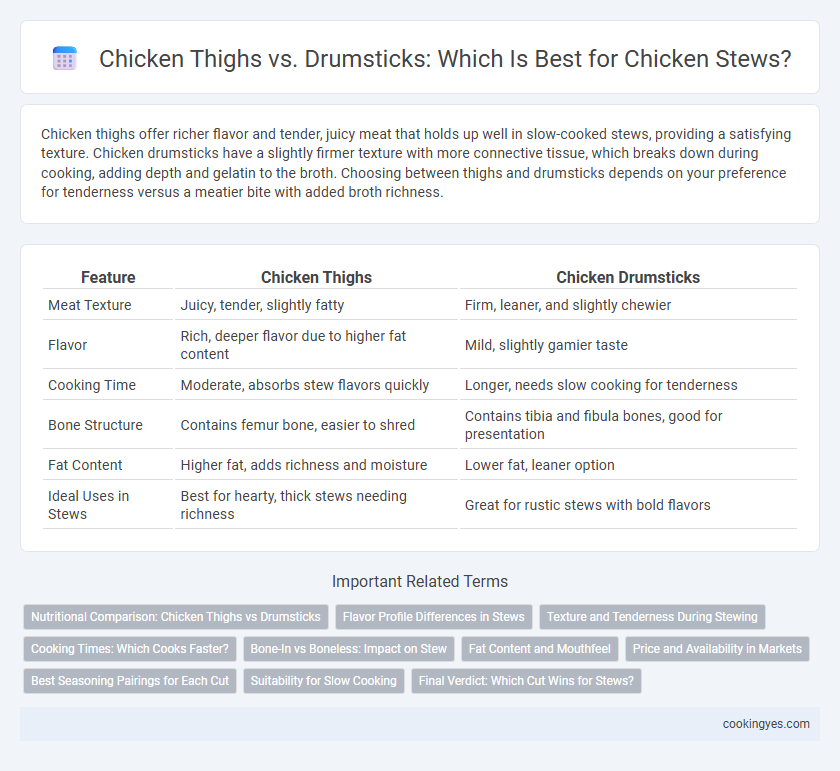Chicken thighs offer richer flavor and tender, juicy meat that holds up well in slow-cooked stews, providing a satisfying texture. Chicken drumsticks have a slightly firmer texture with more connective tissue, which breaks down during cooking, adding depth and gelatin to the broth. Choosing between thighs and drumsticks depends on your preference for tenderness versus a meatier bite with added broth richness.
Table of Comparison
| Feature | Chicken Thighs | Chicken Drumsticks |
|---|---|---|
| Meat Texture | Juicy, tender, slightly fatty | Firm, leaner, and slightly chewier |
| Flavor | Rich, deeper flavor due to higher fat content | Mild, slightly gamier taste |
| Cooking Time | Moderate, absorbs stew flavors quickly | Longer, needs slow cooking for tenderness |
| Bone Structure | Contains femur bone, easier to shred | Contains tibia and fibula bones, good for presentation |
| Fat Content | Higher fat, adds richness and moisture | Lower fat, leaner option |
| Ideal Uses in Stews | Best for hearty, thick stews needing richness | Great for rustic stews with bold flavors |
Nutritional Comparison: Chicken Thighs vs Drumsticks
Chicken thighs contain slightly more fat and calories compared to drumsticks, providing a richer flavor and tender texture ideal for stews. Drumsticks offer higher protein content per serving and contain slightly less fat, making them a leaner choice for healthier meals. Both cuts supply essential nutrients like iron, zinc, and B vitamins, but thighs deliver more omega-6 fatty acids, contributing to a well-rounded nutritional profile.
Flavor Profile Differences in Stews
Chicken thighs offer a richer, more succulent flavor in stews due to their higher fat content, which enhances the dish's overall depth and mouthfeel. Drumsticks provide a slightly leaner taste with a firmer texture, contributing a mild, bone-in richness that intensifies as the meat cooks slowly. Both cuts release collagen that thickens stews, but thighs yield a silkier broth while drumsticks lend a robust, hearty character.
Texture and Tenderness During Stewing
Chicken thighs develop a rich, succulent texture when stewed, maintaining moisture and tenderness due to their higher fat content. Drumsticks, while flavorful, have more connective tissue and take longer to break down, resulting in a slightly chewier bite. Both cuts infuse stews with deep flavor, but thighs yield a melt-in-the-mouth softness ideal for long, slow cooking.
Cooking Times: Which Cooks Faster?
Chicken drumsticks typically cook faster than chicken thighs in stews due to their smaller size and higher surface area to volume ratio, allowing heat to penetrate more quickly. Bone-in, skin-on drumsticks usually take about 30-40 minutes in a simmering stew, while chicken thighs require 40-50 minutes for tender results. Cooking times can vary based on the stew's temperature and thickness of the meat, but drumsticks generally reach optimal tenderness sooner.
Bone-In vs Boneless: Impact on Stew
Bone-in chicken thighs add rich flavor and gelatin to stews, enhancing the overall depth and mouthfeel, while boneless thighs provide convenience and quicker cooking times without sacrificing tenderness. Drumsticks, with their higher collagen content and marrow-rich bones, impart a robust taste and thicker texture ideal for hearty stews. Choosing bone-in cuts infuses the stew with natural juices and nutrients, making it more flavorful and nutritious compared to boneless options.
Fat Content and Mouthfeel
Chicken thighs contain higher fat content compared to drumsticks, resulting in richer, more succulent stews with a tender mouthfeel. Drumsticks, while leaner, offer a firmer texture and slightly drier bite, making them ideal for stews requiring less grease. Choosing thighs enhances stew creaminess due to their marbled fat, whereas drumsticks provide a leaner, meatier experience.
Price and Availability in Markets
Chicken thighs and drumsticks vary in price and availability, with drumsticks generally being more affordable and widely stocked in most markets due to their popularity as a budget-friendly option. Thighs tend to be slightly pricier but offer more meat and richer flavor, making them a preferred choice for hearty stews. Availability can fluctuate seasonally, but both cuts are commonly found in grocery stores and butchers, ensuring consistent access for stew preparations.
Best Seasoning Pairings for Each Cut
Chicken thighs offer a rich, succulent texture ideal for absorbing bold flavors like garlic, smoked paprika, and rosemary, making them perfect for hearty stews. Drumsticks pair well with robust seasonings such as cumin, coriander, and chili powder, enhancing their slightly denser meat and crispy skin when cooked. Both cuts benefit from slow-cooking techniques that intensify the infusion of spices, creating deeply flavorful, tender stew components.
Suitability for Slow Cooking
Chicken thighs offer more tender, flavorful meat with higher fat content, making them ideal for slow-cooked stews as they remain moist and rich after long cooking times. Chicken drumsticks have a slightly firmer texture and less fat, which can result in drier meat if overcooked in stews but provide a good structure for those preferring distinct meat-to-bone ratio. Both cuts benefit from slow cooking, but thighs are generally preferred for stews due to their ability to withstand extended heat while delivering succulent results.
Final Verdict: Which Cut Wins for Stews?
Chicken thighs offer richer flavor and tender texture due to higher fat content, making them ideal for slow-cooked stews. Drumsticks provide a meatier bite with slightly firmer texture but may require longer cooking to become tender. For stews emphasizing depth of flavor and succulence, chicken thighs are the preferred choice.
Chicken Thighs vs Chicken Drumsticks for Stews Infographic

 cookingyes.com
cookingyes.com